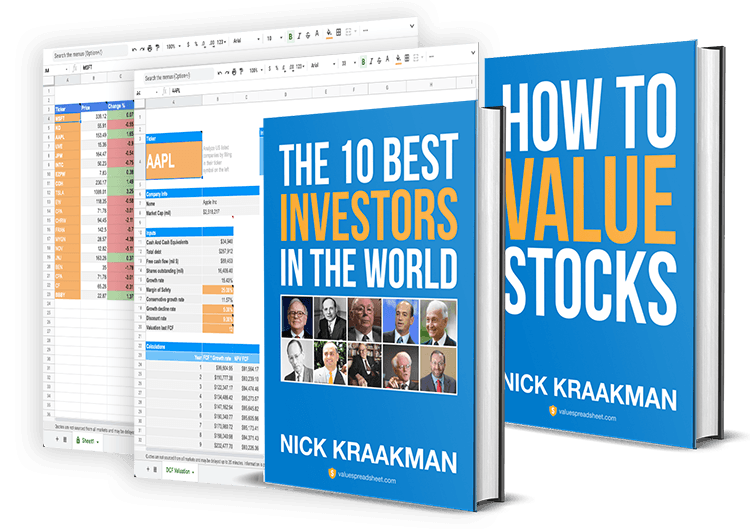Transcript
Hello, and welcome to the second episode of the Value Investing Bootcamp podcast.
I'm your host, Nick Kraakman, and thanks so much for tuning in again, for taking the time to listen to me today. I really, really appreciate it, so, thanks.
Also, I would like to thank everyone who has been sending emails to me reaching out, really encouraging to hear from you, thanks for that as well.
This is actually a podcast which accompanies the release of an online value investing video course.
I've been receiving a lot of questions about that, and I'm trying to answer them all.
So, feel free to send me an email, and I'll be sure to answer you.
You can send your emails to
This will be a limited edition podcast, because I just try to answer some questions that people have about value investing.
I'll try to give you as much information as possible in these relatively short podcast episodes, and by the end of it, if you've listened to all the episodes, you have a fairly good understanding of what investing is all about and you should be able to learn some things along the way.
In today's episode, actually, I want to cover a very simple question because I mentioned the term value investing.
It's also in the name of the podcast.
So, what is value investing actually all about? That's what I'll try to answer in this episode.
Let's get to it!
Value investing is the approach that all the investment greats use.
People like Warren Buffett, Joel Greenblatt, Seth Klarman, Benjamin Graham all use this strategy, value investing.
It works for them, it has been working for them for years, and they have been able to amass billions with it.
They earn above average returns consistently.
And how is that even possible? Because that shouldn't be possible according to most modern financial theories, because most modern financial theories assume that people act rationally.
However, if you look around you, I mean, people make mistakes all the time, so it makes no sense to assume that they make no mistakes on the stock market.
And these mistakes people make are actually the thing that value investors exploit.
When people make mistakes, stocks get mispriced; they become either too cheap or too expensive, relative to what they're actually worth, that's what value investors exploit.
So, if a stock trades at a very cheap price relative to what it's actually worth, realistically worth, then that's a huge opportunity, and it allows you to buy this stock at a discounted price, which actually lowers your risk while maximizing your upside potential.
This is a crucial aspect of value investing.
It is a strategy in which the risk reward is not correlated at all in the common sense of the word, because common knowledge says that if you want higher returns, or at least that's what they teach you on in most finance schools as well, if you want higher returns, you need to take on more risk.
But with value investing, it's exactly the other way around, because the cheaper you buy a stock, the lower your risk is because much of the downside risk is already priced into the stock price, while buying it at a very low price gives you more upside potential at the same time!
So, we could say that the risk reward ratio is actually inversely correlated for value investing.
This is the main reason why investors like Warren Buffett have been able to consistently earn incredible returns on the stock market, because they stick to this very simple strategy of buying financially strong companies, which for one reason or another, for some irrational reason, are very, very cheap.
They are able to buy very good companies at discount prices, and this is really the key of value investing.
Many people asked me if this works, as this is common knowledge, right? I mean, everyone knows that you should buy low and sell high.
So, why doesn't everyone do that?
Well, the funny thing is, hardly anyone does that because they are guided by emotion.
Their investment decisions are guided by emotions, because people do strange things when it comes to money.
They do strange things in general, but especially when it comes to money, so they make the wrong decisions all the time.
Therefore, the majority of individual investors actually underperform the market average, while value investors in general consistently beat the market over time.
Value investing is, however, a long term strategy because in the short term stock prices are completely irrational, they move in unpredictable ways.
Even though many investors base their strategy on predicting stock prices, this is not possible.
Value investors just buy something very, very low at a very, very low price, then they just wait.
They wait until the price, until people wake up, and they realize that the stock is way too cheap.
This pushes the price back to more realistic levels, and this can take weeks, but this can also take years.
Value investors don't pretend to know when they will make a profit, but they are pretty sure that they will make a profit over time, because prices, again, are unpredictable in the short run, but you can be fairly certain that for example, if you buy a house, which is worth $100,000, and if you're able to buy that house for just $50,000, of course you just have to wait until price and value converge again, and you'll have a nice profit on your hands.
So, that's the whole idea behind value investing; to buy great companies at bargain prices.
Because Warren Buffett, once said, and I like this quote a lot, he said "whether we're talking about socks or stocks, we like buying quality merchandise when it's marked down".
And that is the whole philosophy behind value investing, and it has worked amazingly well for Warren Buffett, Joel Greenblatt, and all the other amazing investors.
This strategy is ascribed to Benjamin Graham, he is called the father of value investing.
He wrote several very influential books, for example "The Intelligent Investor", which I highly recommend you pick up and read because it really helps to know where these ideas come from, and that's really the foundation.
And Benjamin Graham was actually the mentor of Warren Buffett.
He is the one who taught Buffett everything he knows, and it has worked quite well for Buffett, he was the third richest man in the world, and he earned all of that money through investing.
And the beauty of all of this is, is that value investing, like I said, buying great companies at discount prices, seems so simple, and it is as long as you know what you're doing.
You can definitely apply it yourself, and in the coming episodes you will learn more about it and we'll go into more detail, and you'll learn how to actually pick stocks like this, like the big guys do, and manage your own portfolio.
So, thanks again for listening, and I'll see you in the next episode.
If you enjoyed today's show, head over to ValueInvestingBootcamp.com to find out more on how you can invest like the pros, manage your own portfolio with confidence, and consistently earn mind boggling returns on the stock market.



